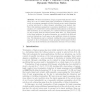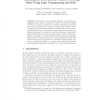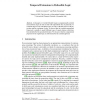1549 search results - page 27 / 310 » On the rules of intermediate logics |
ACL
1998
13 years 10 months ago
1998
This paper reports a pilot study, in which Constraint Grammar inspiredruleswere learnt using the Progol machine-learning system. Rules discarding faulty readings of ambiguously ta...
ICLP
2004
Springer
14 years 2 months ago
2004
Springer
Abstract. We study termination of logic programs with dynamic scheduling, as it can be realised using delay declarations. Following previous work, our minimum assumption is that de...
CHARME
2003
Springer
14 years 2 months ago
2003
Springer
We present a non-operational approach to specifying and analyzing shared memory consistency models. The method uses higher order logic to capture a complete set of ordering constra...
UCS
2007
Springer
14 years 3 months ago
2007
Springer
Abstract. We propose D-FLER, a distributed, general-purpose reasoning engine for WSN. D-FLER uses fuzzy logic for fusing individual and neighborhood observations, in order to produ...
AUSAI
2007
Springer
14 years 3 months ago
2007
Springer
In this paper, we extend Defeasible Logic (a computationally-oriented non-monotonic logic) in order to deal with temporalised rules. In particular, we extend the logic to cope with...



